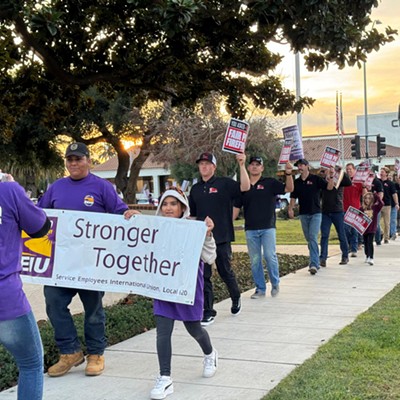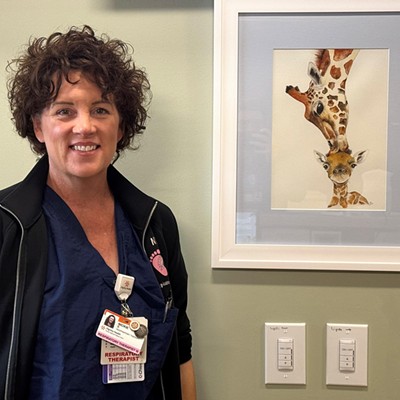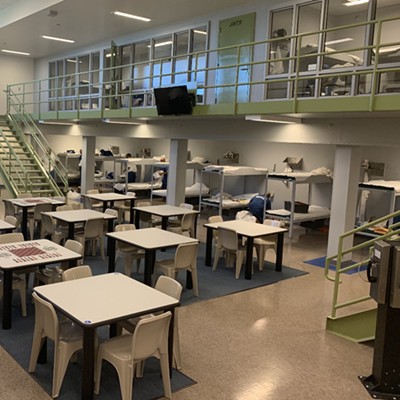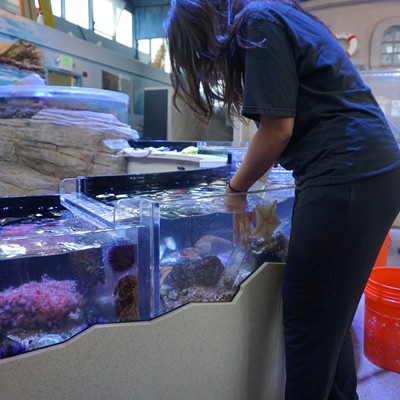The Santa Maria Police Department arrested Jonathan Paul Thomas on suspicion of domestic violence and false imprisonment on Jan. 11 at 9:32 p.m. They transported him to the Santa Barbara County Main Jail, where the 45-year-old made statements about suicide and was escorted to a single-occupant safety cell, according to the Sheriff’s Office.
Deputies found Thomas dead on Jan. 12 at 2:03 a.m.
“What is clear so far in the investigation is that once inside the safety cell, custody deputies removed Thomas’ clothing, he was placed face down onto the floor of the cell, his handcuffs were removed, and the custody deputies exited the cell. Minutes later, custody deputies noticed that Thomas was not moving,” sheriff’s officials said in a statement.
Custody deputies performed CPR and requested emergency medical response, but these measures were unsuccessful. An autopsy was scheduled for Jan. 13, but Sheriff’s Office Public Information Officer Raquel Zick told the Sun that the cause of death remains unknown.
In limbo
Often those who are booked into the jail with mental health issues get worse if they don’t get formalized treatment, according to county Assistant Public Defender La Mer Kyle-Griffiths.
These kinds of mental health issues have plagued the Main Jail’s history, something a 2020 lawsuit settlement aimed to remedy. But short staffing and COVID-19’s restrictive policies have limited the jail’s mental health care expansion—as well as inmates’ access to services, local psychologist Susan Ferrant said. This includes mental health forensic evaluations.
“A forensic evaluation provides the court [with] specialized information that can only be provided by a psychologist, and the specialized information can be critical to the kinds of judicial decisions that judges have to make,” Ferrant said.
Ferrant works on a panel of alienists: a group of neutral, certified psychologists who are selected by the court to perform forensic evaluations—an hour-long conversation to understand whether a person’s mental illness undermines their ability to think clearly and act intentionally. Evaluations are required by law when an attorney questions the defendant’s ability to understand trial procedures or if the crime could have been caused by mental health-related issues, she said.
“They have to have a rational and factual understanding of the facts of their case, and a lot of things interfere with that,” she said. “This is a task of how clearly you can think; it sounds simple, but it’s not that simple.”
Ferrant had three clients to visit in December but couldn’t enter the Main Jail due to COVID-19 visitor restrictions, making it impossible for her to complete her evaluations and meet her deadlines; thus their respective trials couldn’t continue, she said.
Sheriff’s Office Public Information Officer Zick told the Sun that evaluations have been performed using video conferencing and are facilitated when staff is notified.
Ferrant said scheduling virtual meetings has also been difficult and limits the time she can spend on the evaluations. She’s since stopped taking meetings at the jail, she added.
“The system is already jammed up, but this adds to the jam-up; it backs everything up. … I understand—especially with COVID—that we’re all working in a difficult, backed-up system. … However, it can become very frustrating when alienists are not given the support they need to do their job,” she said.
There are currently 33 people in the jail who have been found incompetent to stand trial and are waiting for placement in restoration programs in a mental health facility, said Aaron Fischer, an attorney with King and Spalding.
“That’s almost 5 percent of the jail population that is in limbo. And there’s more than that because there are people waiting for their evaluation,” he said.
Fischer worked on the 2017 Murray v. County of Santa Barbara lawsuit, which addressed conditions at the jail. He now receives weekly data about the jail’s progress toward improvement, which is monitored by court-appointed experts, he said.
“The Murray case requires a significant expansion of mental health services for people who are incarcerated and in need of care. That expansion has not occurred. The staff had planned for creation of enhanced mental health programming, but due in part to COVID, lack of staffing, and resources, that programming has not gotten off the ground,” he said.
Impediments or excuses?
The Santa Barbara County grand jury also investigated mental health services at the jail after an inmate suicide in early 2021—the fourth inmate to commit suicide in less than three years, the report stated.
“The jury’s investigation revealed that process improvements were needed in the areas of communication between deputies and medical professionals, training in the identification of potential suicidal ideation when it’s not openly stated, the application of ‘urgent need for medical care,’ and the availability of appropriate mental health professionals on a 24/7 basis,” the report said.
The grand jury believes future changes and improvements are needed with around-the-clock coverage by on-site medical professionals, improved communication between deputies and mental health professionals, and improved training, the report stated.
Mental health forensic exams are one tool that can be used to discover whether a person has mental health-related issues that need attention. Granting doctors access can allow inmates to receive resources faster, Public Defender Kyle-Griffiths said.
Since early December, doctors have reached out to Kyle-Griffiths because they weren’t allowed into the jail—regardless of their vaccination status—and weren’t able to complete their evaluations.
“One doctor personally said she had 12 cases pending because she was not allowed to get into the jail. There’s a larger number, but I can only speak to those we are representing,” Kyle-Griffiths said.
Attorneys normally aren’t involved in the court-mandated process, but she and her fellow attorneys at the Public Defender’s Office created a list of their clients with mental health-related concerns in order to get the jail’s cooperation. However, she said, they’re still having difficulties with doctors showing up to meet with inmates and getting turned away.
“The real problem and issue—and it’s so stark here—is so many other communities have figured out ways to do this, where as long as you bring in proof of vaccination you can come and set up meetings,” Kyle-Griffiths said. “That piece has been particularly problematic because here, there are folks just sitting, including those needing evaluation and those needing treatment or intensive services.”
She’d like to see more collaboration between the elected county district attorney, the sheriff, and the Public Health Department for proactive responses and robust collaboration to get out of “crisis mode.”
“We all want people to be safer, and we also want people in the jail to be safer, but we aren’t giving the most vulnerable people the chance to be released and get the services they need. COVID has almost become an excuse rather than a real impediment,” she said.
Positive steps
Although the Santa Barbara County Main Jail has a long way to go, attorney Fischer said there have been some positive actions.
“The jail within the last year-and-a-half began their competency treatment program that serves 10 people, roughly a quarter of the need. It’s not getting the county where they need to be, but it’s a step in the right direction,” Fischer said.
The county grand jury report also noted improvements for inmates’ mental well-being with the Main Jail’s National Commission on Correctional Health Care accreditation, ensuring that it’s in compliance with these standards and had established a risk mitigation committee. The jail increased daily yard time, and computer tablets, art supplies, and journals became available to inmates.
The Northern Branch Jail, which recently opened, is another solution with operational features designed to help those with mental health issues, the grand jury’s report stated.
The sooner these resolutions are implemented, the better it will be for patients, the community, and the entire court system, Fischer said.
“There is a staggeringly high amount of people with mental health needs in the jail right now, and delays serve nobody. It overworks employees, bottlenecks the court system, and delays mental health services,” Fischer said. “Longer incarceration and delayed mental health services certainly don’t serve the community, not fiscally and not for public safety.”
Reach Staff Writer Taylor O’Connor at [email protected].










